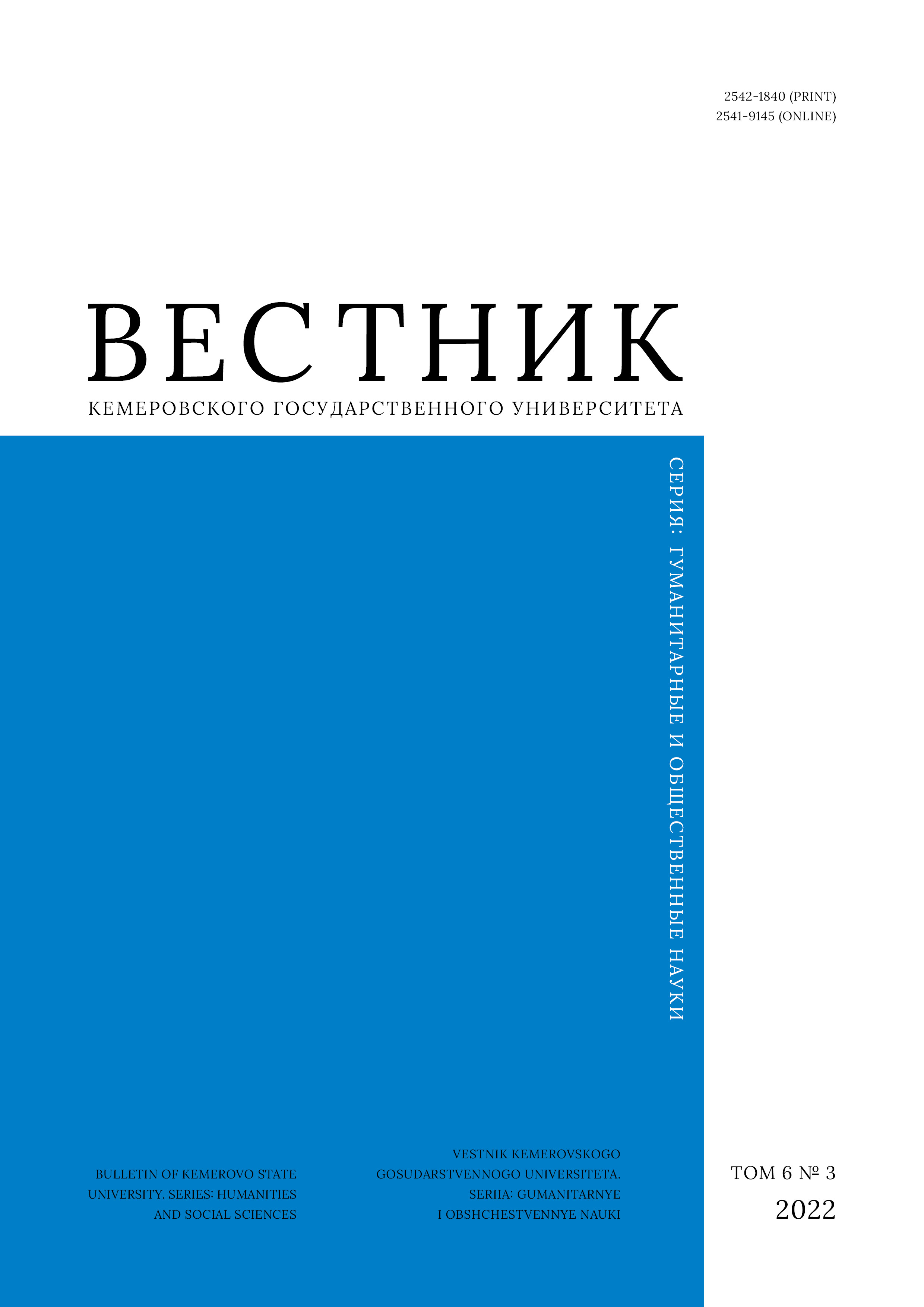Kemerovo, Russian Federation
Kemerovo, Russian Federation
The article focuses on sensorimotor and perceptual processes in primary school children with multiple developmental disorders. The study involved 40 children aged 9–11 with multiple developmental issues. All the participants studied at the Secondary School of Psychological and Pedagogical Support No. 101 (Kemerovo, Russia). The experiment relied on the method developed by N. I. Ozeretskiy and M. O. Gurevich as the main diagnostic tool. The method combines a set of diagnostic tasks aimed at measuring the level of motor and perceptual development in children. The experimental study also included elements of the neuropsychological approach. The authors designed and conducted a series of practice sessions on the development of sensorimotor and perceptual processes. The neuropsychological exercises developed purposeful voluntary actions with objects and materials, improved available sensory experience, increased visual-motor coordination, sharpened the ability to navigate in various physical environments, and improved body control. They facilitated the compensation of residual reflexes, as well as the development of speech and general motor rhythmization. The exercises involved orthopedic mats, massage balls, tasks on visual-motor perception and integration, Balametrics cerebellar stimulation, etc. Statistic results showed a positive trend in the sensorimotor and perceptual processes, except for complex forms of space and time perception.
sensory sphere, perceptual processes, cognitive rehabilitation, visual-motor coordination, primary school age, children with multiple developmental disorders, cerebellar stimulation method
1. Alekhina S. V. Special educational needs as a category of inclusive education. Russian scientific journal, 2013, (5): 132-139. (In Russ.)
2. Furyaeva T. V. Integration of special children in society. Pedagogika, 2006, (7): 29-38. (In Russ.)
3. Usacheva L. V. Sensorimotor development in children with severe multiple developmental disorders as a factor of cognitive activity. Molodoi uchenyi, 2018, (17): 297-298. (In Russ.)
4. Rodin Yu. I. Human psychomotor system in the context of systematic and evolutionary paradigms. Izvestiia Tulskogo gosudarstvennogo universiteta. Gumanitarnye nauki, 2011, (3-1): 389-395. (In Russ.)
5. Psychological problems of correctional work in an auxiliary school, eds. Shif Zh. I., Petrova V. G., Golovina T. N. Moscow: Pedagogika, 1980, 176. (In Russ.)
6. Rubinshtein S. Ia. Psychology of a mentally retarded student. 3rd ed. Moscow: Prosveshchenie, 1986, 192. (In Russ.)
7. Vygotsky L. S. Fundamentals of defectology. Moscow: Iurait, 2021, 332. (In Russ.)
8. Maller A. R., Tsikoto G. V. Education and training of children with severe intellectual disability. Moscow: Akademiia, 2003, 208. (In Russ.)
9. Zabramnaya S. D., Borovik O. V. Methodological recommendations for the manual "Psychological and pedagogical examination of children" by S. D. Zabramnaya and O. V. Borovik. Moscow: Vlados, 2003, 32. (In Russ.)
10. Shalamova N. V., Shatunova S. A., Egorova N. L. Psychological and pedagogical characteristics of primary school children with intellectual disabilities. Innovative technologies in science and education: Proc. V Intern. Sci.-Prac. Conf., Cheboksary, 27 Mar 2016. Cheboksary: CSC "Interactive plus", 2016, vol. 1, iss. 1, 287-290. (In Russ.)
11. Galperin P. Ya. Experience in studying the formation of mental actions. Vestnik Moskovskogo Universiteta. Seriya 14. Psikhologiya, 2017, (4): 3-20. https://doi.org/10.11621/vsp.2017.04.03
12. Mastiukova E. M. A child with developmental disabilities: early diagnosis and correction. Moscow: Prosveshchenie, 1992, 95. (In Russ.)
13. Mozgovoi V. M., Iakovleva I. M., Eremina A. A. Fundamentals of oligophrenic pedagogy. Moscow: Akademiia, 2006, 224. (In Russ.)
14. Metieva L. A., Udalova E. Ia. Sensory education of children with developmental disabilities: a collection of games and game exercises. Moscow: Knigoliub, 2007, 120. (In Russ.)
15. Andrushko E. N., Shkliar N. V. Recommendations for teacher-defectology and educator on the organization corrective pedagogical work aimed at the development of fine motor skills of senior preschool children with intellectual disabilities. Karelian Scientific Journal, 2016, 5(1): 7-10. (In Russ.)
16. Osipova L. B., Balina E. V. Individualization of correctional work on the development of fine motor skills in preschoolers with visual impairments. Molodoi uchenyi, 2016, (24): 494-497. (In Russ.)
17. Tokarskaya L. V., Dubrovina N. A., Babiichuk N. N. Teaching physical education to children and adolescents with moderate and severe mental retardation. Ekaterinburg: UrFU, 2015, 190. (In Russ.)
18. Voilokova E. F., Andrukhovich Iu. V., Kovaleva L. Iu. Sensory education of preschoolers with intellectual disabilities. St. Petersburg: KARO, 2005, 294. (In Russ.)
19. Psychological diagnostics, eds. Gurevich K. M., Borisova E. M. Moscow: URIO, 1997, 304. (In Russ.)
20. Kisova V. V., Frolova E. N. On the issue of effectiveness of methodological tools used in the psychoeducational diagnosis of children with disorders of psychological development. Karelian Scientific Journal, 2019, 8(1): 17-20. (In Russ.) https://doi.org/10.26140/knz4-2019-0801-0004
21. Serkina A. V. Communication tools used by children with severe multiple developmental disorders and deep mental retardation. Defektologiia, 2019, (6): 68-71. (In Russ.)
22. Gorina E. N. Correctional and pedagogical work with children with severe multiple developmental disorders in a boarding house. Baltic Humanitarian Journal, 2019, 8(4): 47-51. (In Russ.) https://doi.org/10.26140/bgz3-2019-0804-0009
23. Asikritov V. N., Alekseeva T. A. Education and upbringing of children with severe multiple developmental disorders (on the experience of Saint Petersburg Nursing House № 1 for children with disabilities and mentally disabled persons from the childhood). Vospitanie i obuchenie detei s narusheniiami razvitiia, 2019, (5): 54-61. (In Russ.)
24. Additional general education programs for children and adolescents with severe and multiple developmental disorders, eds. Asikritov V. N., Alekseeva T. A., Korjova E. Yu. St. Petersburg: LEMA, 2015, 447. (In Russ.)
25. Tolkacheva A. V. Formation of sensorimotor skills in children of primary school age with severe multiple developmental disorders. Actual problems of modern humanitarian knowledge: Proc. III All-Russian Sci.-Prac. Conf. with Intern. Participation, Kemerovo, 6 Dec 2019. Kemerovo: KemSU, 2020, 115-117. (In Russ.)
26. Luria A. R. Higher cortical functions in man. St. Petersburg: Piter, 2020, 768. (In Russ.)
27. Khaustova E. G., Martynov A. A. The use of cerebral stimulation techniques in vestibular gymnastics of younger schoolchildren with mental retardation. Pedagogicheskiy IMIDZH, 2021, 15(3): 324-334. (In Russ.) https://doi.org/10.32343/2409-5052-2021-15-3-324-334


















